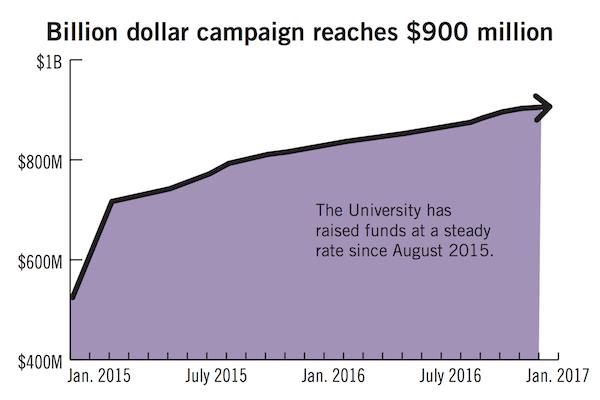The University’s capital fundraising campaign has passed 90 percent of its goal, reaching $903 million.
With only eight months left until the campaign’s deadline, officials said they are pleased with its momentum and are “ramping up” fundraising efforts to attract donors until the end of 2016. Experts said to cross the final threshold, leaders need to have clear fundraising goals and appropriate volunteer and staff support to reach out to alumni and others who are most likely to give.
More than 61,000 donors have contributed to the campaign, including 38,935 alumni, according to the campaign’s website.
Aristide Collins, the vice president for development and alumni relations, said in an email that fundraising officials are “working hard” to achieve the $1 billion goal. He declined to say if his office is on track to reach the goal by June 2017. The campaign was originally scheduled to end in June 2018, but officials pushed up the date in hopes of reaching $1 billion before University President Steven Knapp steps down after this academic year.
Collins said fundraising efforts will ramp up for the rest of the calendar year, as “the giving season” begins, when many people are motivated to make donations and take advantage of the chance to get charitable deductions on their income taxes before the close of the calendar year.
As part of that buildup, GW participated in Giving Tuesday, an international day of philanthropy after Black Friday, Small Business Saturday and Cyber Monday, for the fourth year in a row. Collins declined to say how much money the University raised on Giving Tuesday this year or in the past.
“Our successful fundraising results were consistent with previous years,” Collins said. “We are grateful for the hundreds of donors who supported GW on that day.”
This day of giving also kicked off a month-long fundraising effort called “Give the Gift of Education,” he said.
“We will continue to reach out to alumni, parents and friends throughout the month of December via face-to-face conversations, direct mail, email, phone and social media to share the powerful impact that philanthropy has on GW students, faculty and programs,” Collins said.
Officials said earlier this year that the final months of the campaign would be focused on raising money to support financial aid and the University’s internship grant fund, and approximately 16 percent of donations given during the course of the campaign are earmarked for those resources.
Notable gifts from this academic year include a pledged $3.2 million gift to the School of Media and Public Affairs in October to fund an endowed chair, from Char Beales, a 1973 alumna and chair of the school’s advisory council and her husband Howard Beales, a professor of strategic management and public policy.
And in November, an anonymous donor gave a $4.8 million gift to the business school to fund a professorship.
Between August and November, the campaign was raising an average of about $6.5 million per month. This is consistent with giving rates over the past year, although the giving rate was much higher during the campaign’s first public year.
The total amount raised in the campaign grew by about 3 percent over the past four months, slightly more than it grew in the same period of time last year. Comparatively, the growth rate between August and October 2014 was about 14 percent.
Collins declined to say what his goals are for giving rates from now until the end of the campaign.
Experts in higher education fundraising said as the University enters the last phase of its campaign, officials should be contacting alumni for gifts and providing clear information about the fundraiser’s goals to ensure that they meet the $1 billion mark.
Chris Ponce, the associate vice president for development at Whitman College, said that while compelling goals, adequate staffing and passionate volunteer leadership are always important, they are especially crucial to maintain while reaching the final goal. The University’s development offices hired more staffers this semester, which experts said was a strategic move for long-term fundraising beyond the campaign.
Ponce said as GW approaches the deadline, gifts and donors the University is close to collecting are important, especially as Knapp prepares to leave his role. Knapp has been an effective fundraiser throughout his tenure.
“It’s the gifts and potential donors that are in GW’s pipeline that matters,” Ponce said. “And I imagine many people are working very hard to meet the goal.”
Colin Riley, the executive director of media relations at Boston University, emphasized the importance of maintaining positive connections with alumni as a way to achieve fundraising goals. Boston University passed the $1 billion mark for its fundraising campaign in April 2016, a year ahead of schedule, and is now striving to raise an additional $500 million by 2019.
GW’s Alumni Weekend in October focused on strengthening alumni connections in addition to collecting donations.
“It’s important to have strong connections with your alumni, donors and most recent alumni as well as long term alumni,” Riley said. “You’re looking at the people’s ability to give the most substantial gifts.”







